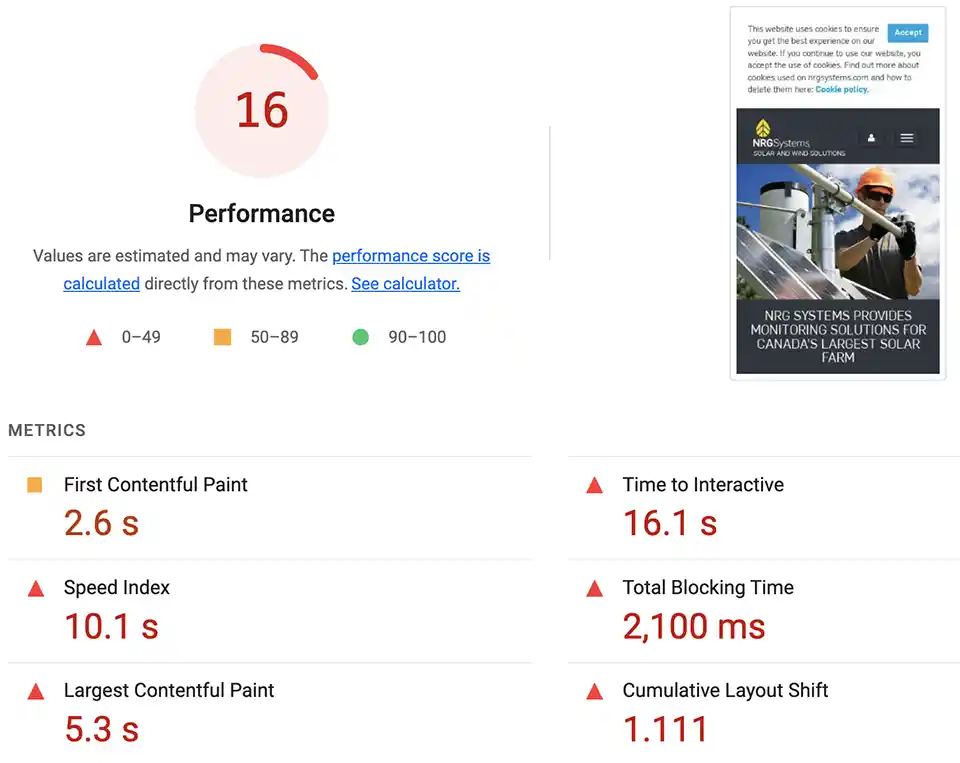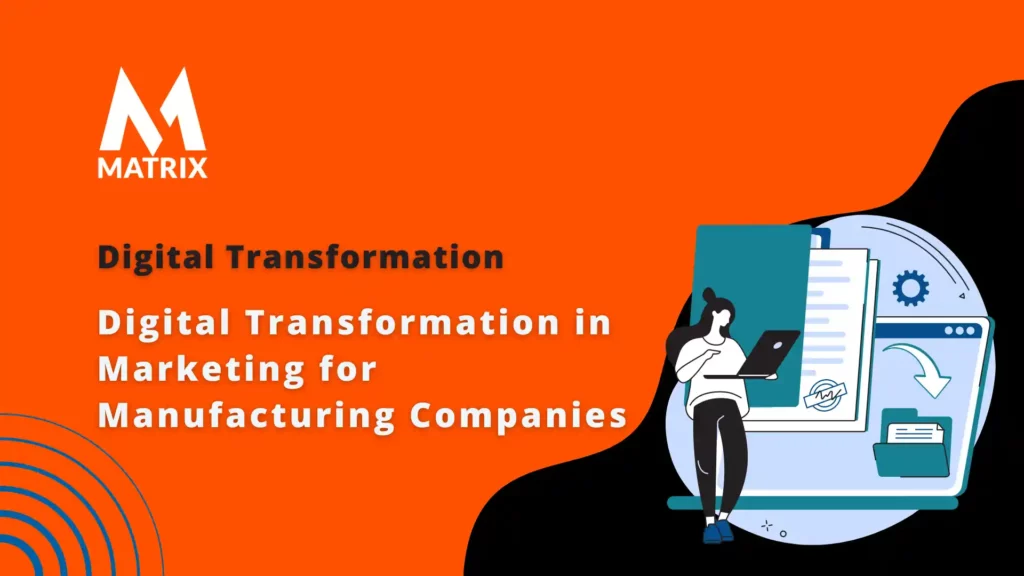Digital Transformation in Marketing for Manufacturing Companies
Digital transformation in marketing has revolutionized how businesses operate from top to bottom. As technology and consumer trends evolve rapidly, manufacturing companies must embrace digital transformation and modernize their strategies accordingly.
In an era characterized by rapid technological advancement, manufacturing companies increasingly recognize the importance of digital transformation in marketing. This transformative journey involves leveraging digital technologies to redefine and enhance how manufacturing firms engage with their customers and deliver value.
The advent of artificial intelligence (AI), machine learning (ML), big data analytics, and cloud computing has revolutionized traditional marketing strategies. These technologies facilitate a deeper understanding of customer behavior, predictive analysis, and personalized customer experiences, driving business growth and competitive advantage. As we move into a digital future, the fusion of marketing and technology in the manufacturing sector is no longer a luxury but a strategic necessity.
Marketing in the digital age: What leaders should know

Effective digital transformation helps businesses evolve and thrive, but transforming can be daunting. Successful adaptation to the digital enterprise can mean the difference between a floundering company and a flourishing one.
By leveraging cutting-edge tools and techniques, manufacturers can open up new demand channels, increase profits, and gain an edge over the competition.
In this blog post, we will explore how implementing a streamlined workflow can help unlock powerful insights into customer behavior, optimize internal processes, and deliver exceptional prospect experiences that foster loyalty in the long term.
Digital Transformation in Marketing for Manufacturing Companies

Digital transformation in marketing can be hugely beneficial for manufacturing companies. By leveraging digital transformation tools, manufacturers have the potential to improve their customer relationships and enhance their access to new markets.
With the right strategies in place, manufacturers can better understand their customers’ needs and preferences, which will assist them in creating better content and campaigns. Additionally, manufacturers can streamline processes such as lead generation and tracking using digital technologies, improving efficiency and cost-effectiveness.
The possibilities are endless; with the right implementation plan, digital transformation can revolutionize how manufacturing companies market themselves.
Benefits of Using Digital Technology for Manufacturing Companies
Manufacturing companies see tremendous benefits by leveraging digital technology in their operations. Digitizing the processes and implementing automation increases production efficiency, reduces manual errors, and brings more consistency to the overall quality control process.

By using predictive analytics, manufacturers can easily anticipate demands in their industry and prepare for upcoming market changes. Moreover, IoT sensors enable a connected network of machines and systems on-site that not only actively monitors for any technical issues but also offers visibility into important performance metrics such as speed, temperature, or pressure measurements from various points on the production line.
This brings operational excellence and cost savings to manufacturing companies by reducing downtime due to malfunctioning equipment while providing instant access to data analysis results. With its many advantages, it is no surprise that digital transformation gives manufacturing businesses an edge over their competitors in today’s crowded global markets.
Challenges and Considerations for Planning a Digital Transformation Strategy

With digital transformation becoming an increasingly important factor in marketing, creating a digital transformation strategy is essential for success.
Planning and executing successfully can be challenging; key considerations when developing such a strategy include aligning it with organizational objectives, taking a customer-centered approach, and incorporating digital awareness into daily business operations.
Ensuring the right technology is available to support the desired updates is also important. Lastly, a complete data audit must ensure customer trust and security. With these aspects in mind, businesses can create effective changes to optimize performance and customer convenience.
Strategies to Overcome Common Digital Transformation Challenges
The ever-evolving digital marketing landscape can present organizations with a multitude of challenges, and as such, implementing successful digital transformation strategies requires foresight, planning, and commitment. Some common obstacles include cost constraints, legacy systems, and resistance to change within the industry.
To address any cost-related issues, organizations should review existing budgets and payment plans to identify any areas of existing funds that can be reallocated or reprioritized. Additionally, leaders should facilitate open dialogue about adaptation to new organizational technologies or processes.
To ensure a smooth transition between legacy systems and new technology frameworks, organizations must ensure their approach is thoroughly tested and adequately prepared for any changes.
Finally, by engaging employees in finding innovative solutions and listening to their feedback throughout the process, there is a greater likelihood of strong buy-in from within the company culture for digital transformation in marketing and initiatives.
Strategies to Overcome Common Digital Transformation Challenges

The ever-evolving online marketing landscape can present organizations with a multitude of challenges, and as such, implementing successful digital transformation strategies requires foresight, planning, and commitment. Some common obstacles include cost constraints, legacy systems, and resistance to change within the industry.
To address any cost-related issues, organizations should review existing budgets and payment plans to identify any areas of existing funds that can be reallocated or reprioritized. Additionally, leaders should facilitate open dialogue about adaptation to new organizational technologies or processes.
To ensure a smooth transition between legacy systems and new technology frameworks, organizations must ensure their approach is thoroughly tested and adequately prepared for any changes. By engaging employees in finding innovative solutions and listening to their feedback throughout the process, there is a greater likelihood of strong buy-in from within the company culture for digital transformation initiatives. AI Digital Marketing Trends and Future for Matrix Marketing Group [Interview]
Best Practices for Implementing a Successful Digital Transformation Plan

Digital transformation is a critical component of successful marketing plans. To ensure success with a digital transformation, businesses need to have a well-crafted plan that addresses the existing challenges and builds on current successes. You can get results like this too.
Some best practices for implementing an effective plan include focusing on customer experience, leveraging data to inform decisions, cultivating an innovation culture, testing new ideas and technologies, and prioritizing scalability.
By following these best practices, businesses can effectively improve their digital marketing operations to keep pace with the rapidly changing landscape of today’s digital world.
How Automation Can Streamline Your Digital Transformation Processes
Automation is vital in streamlining digital transformation processes as it can automate manual tasks and improve operational efficiency. Automation can be easily implemented thanks to today’s technology, improving productivity, increased scalability, and reduced costs. Content Marketing Financial Firms
By automating marketing activities like email campaigns, web analytics, and organizing digital assets, companies get real-time visibility into their digital performance and become better equipped to respond quickly to customer needs.
Automation assists by streamlining activities like data analysis with platforms like AI-driven data discovery tools that simplify complex processes. It also allows marketers to target users more accurately through digital channels with less effort and gain insight into user behaviors across various channels. By leveraging these tools, businesses can obtain complete visibility of their marketing efforts and have a streamlined workflow for future success.
Google Analytics helped optimize a manufacturing business.
Advances in marketing technology have revolutionized the way modern businesses can operate. Google Analytics is a powerful tool that has greatly contributed to increased success for many companies, including manufacturing businesses.
Providing real-time website user analytics has helped optimize their processes and enable more efficient operations.
Furthermore, Google Analytics provides critical insights into customer behavior and preferences, allowing businesses to make data-backed decisions confidently. With this information, manufacturers have been able to pivot and adapt quickly to changing trends in the consumer market and achieve greater success.
Small manufacturers that have great results from a Digital transformation in Marketing
Several small manufacturing brands have recently seen significant success due to digitally transforming their marketing tactics. Digital transformation in marketing examples with digital transformation marketing strategy.
These manufacturers demonstrate the potential for digital transformation. Provancer’s use of influencer campaigns and video ads on social media led to a growth in sales.
Biosports Technologies is another inspiring story. Email campaigns, SMS marketing, and retargeting resulted in a 73% ROI increase with 40% fewer customer acquisitions. That’s a great digital transformation marketing campaign.
Also stunning are MicroBioreactors’ push into targeted e-commerce platforms such as Amazon, which led to a 1630% boost in online sales growth. SEO for Professional Services Firms
Stryver Devices retailing through Facebook ads skyrocketed their sales by 86%. These powerful examples highlight the unique benefits digital transformation provides for marketing strategies in the manufacturing industry, where increased visibility and personalized experience contribute to unparalleled sales growth.

AI Toolkit for Technology Companies
We’ve included a complete list of AI tools for technology firms, with over 800 free prompts and an AI Cheat Sheet to help you get started and leverage artificial intelligence faster.
AI Toolkit for Technology Companies
Conclusion on digital transformation in marketing
Digital transformation in marketing has become essential for modern businesses to stay competitive.
The success of a venture depends on its ability to adopt the latest technologies and trends to reach a wider audience, achieve higher profits and gain market share.
By embracing this digital revolution, companies can ensure their continued success and establish themselves as leaders in their respective fields. Ultimately, digital transformation allows organizations to make well-informed decisions, deploy effective strategies and remain agile within the ever-evolving market. Read digital transformation in marketing articles.
The digital transformation of marketing is essential for manufacturing businesses to increase their reach, reduce overhead costs and streamline operations. To successfully manage a digital transformation plan, manufacturers must focus on effectively integrating technology into their processes, understanding the customer journey, seeking new opportunities, and understanding key analytics. Automation can further aid manufacturers’ digital transformations by optimizing current processes and making them more efficient.
Furthermore, the success stories of many small manufacturers demonstrate the value of a digital transformation in marketing. Therefore, businesses must recognize the importance of digital transformation and invest in strategies to support their businesses’ ever-evolving needs.
We hope you’ve learned some valuable tips that will help you unlock the potential that lies within digital marketing! If you want advice on implementing a successful digital transformation plan tailored to your business needs, look no further than this article.
We hope you’ve learned some valuable tips that will help you unlock the potential that lies within digital marketing!
General FAQs about digital transformation in marketing
What is Digital Transformation in Marketing?

Digital Transformation in Marketing is leveraging digital technologies and strategies to optimize marketing goals and objectives. This includes utilizing various data-driven analytics tools to gain better insights into customer behavior and preferences, allowing businesses to make informed decisions.
How can Automation help with Digital Transformation?

Automation enables successful digital transformation plans in the manufacturing industry. It helps streamline operations by optimizing current processes and making them more efficient by reducing manual labor costs and eliminating human error. Automation also allows quicker response times when engaging with customers, improving the customer service experience.
What type of Results can be Expected from Implementing a Digital Transformation Plan?

Implementing a digital transformation plan yields different results depending on the company’s focus areas and specific needs. Generally speaking, companies can expect enhanced visibility & reach, cost savings, added value & personalization to customers, improved customer loyalty & engagement, increased sales & ROI, decreased overhead costs, streamlined operations, and access to real-time data & analytics that enable informed decisions.
What are some Inspiring Examples of Successful Digital Transformations?

Several small manufacturing brands have recently seen success due to transforming their marketing tactics digitally, such as Provence, whose use of influencer campaigns led to a growth of sales of over 200% within 12 months, or Stryver Devices retailing through Facebook ads, which resulted in an 86% boost in sales growth.

